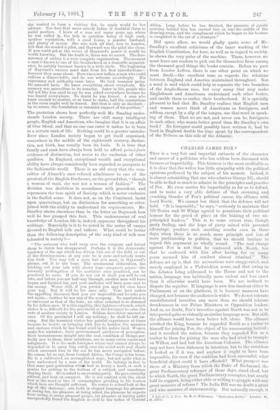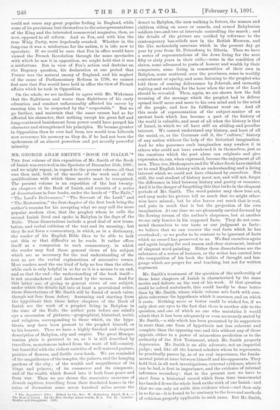CHARLES JAMES FOX.*
THIS is a very fair and impartial estimate of the character and career of a politician who has seldom been discussed with fairness or impartiality. This fairness is the more creditable as it is clear that the writer has little sympathy with the political, opinions professed by the subject of his memoir. Indeed, it is almost astonishing that one who admires George III., should be able to find so much to admire in the principles and practice. of Fox. He even carries his impartiality so far as to defend, and to make a very able defence of that crowning and crushing blunder of Fox's political career, his alliance with Lord North. We cannot but think that the defence will not hold. "It is impossible," he says, " seriously to maintain that 120 Tories and 90 Whigs agreed to prostitute their political' honour for the greed of place at the bidding of two un- principled leaders." This is to some extent true, thoughl party feeling, and the hope of party mixed with personal advantage, produce such startling results even in these days, when there is so much more principle and less of mere partisanship in politics, that we should hesitate to regard this argument as wholly sound. "The real charge against Fox is not that he coalesced with North, but. that he coalesced with him after having for so many years accused him of conduct almost criminal." The- defence set up is, that the accusations were exaggerated, and merely employed in a Pickwickian sense, and that owing to- the debates being addressed to the House and not to the- nation, language was habitually more violent and less exact than it otherwise would have been. We are inclined to dispute the sequitur. If language is now less insolent either in Parliament or on the platform, it is because manners have not because the audience is wider. We do not tolerate unadulterated invective any more than we should tolerate drunkenness in our Prime Ministers or Opposition leaders.. And so, no doubt, Fox's invective against North was not to be interpreted quite so violently as similar language now. But still, the alliance would have been better left alone. The alliance revolted the King, because he regarded North as a traitor to himself for joining Fox, the object of his unreasoning hatred ;. and it revolted the nation, because they regarded Fox as a traitor to them for joining the man who had tried to trample on Wilkes, and had lost the American Colonies. The alliance may not have been dishonest in intention, but to the outsiders it looked as if it was, and anyhow it ought to have been impossible, for even if the coalition had been successful, what beneficial object could it have effected A What prospect was there of a Ministry from which the Duke of Richmond, the great Parliamentary reformer of those days, stood aloof, but to which North, the great Parliamentary corrupter, lent nearly half its support, being either able or willing to grapple with any great measure of reform P The India Bill was no doubt a great. and wise measure of statesmanship. But naturally enough, it • Life of C. J. Fox. By H. 0. Wakeman. "Statesmen Series." London : W. H. Allen. could not rouse any great popular feeling in England, while some of its provisions lent themselves to the misrepresentations .01 the King and the interested commercial magnates, then, as now, opposed to all reform. And so Fox, and with him the true Whig Party, were hopelessly crushed. Whether in the long-run it was a misfortune for the nation, it is idle now to 'speculate. If we could be sure that Fox in office would have viewed the French Revolution through the same spectacles with which he saw it in opposition, we might hold that it was a. misfortune. But in view of Fox's action and doctrine on the Regency question, his declaration at one period that France was the natural enemy of England, and his neglect of the cause of Parliamentary Reform in 1790, we cannot feel sure that Fox would have held in office the view of French affairs which he took in Opposition.
On the whole, we are inclined to agree with Mr. Wakeman that the flightiness and worse than flightiness of his early education and conduct unfavourably affected his career by .causing him to be suspected by the " respectable." But we go further, and maintain that the same causes had so far affected his character, that nothing except his great fall and long-continued banishment from power could have purged his -character and strengthened his principles. He became greater in Opposition than he ever had been, nor would true Liberals now reverence his memory as they do, if he had not been the spokesman of an almost powerless and yet morally powerful minority.



































 Previous page
Previous page